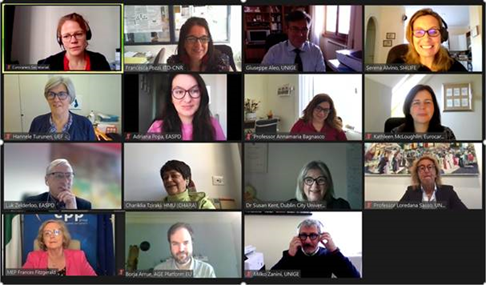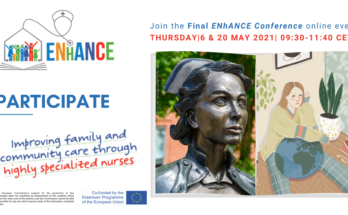Hosted by Eurocarers, Part II of the ENhANCE Final Conference, was held on Thursday 20th May 2021, in the format of a Zoom webinar, and counted some 124 participants. The programme was broader and the main aim was to open up the discussion on the wider issues of community-based care by including a number of stakeholder perspectives, as well as policy makers at EU-level.
The full recording can be viewed, by clicking here:
 MEP Frances Fitzgerald opened the meeting, and given her experience and background as a social worker, and familiar with working in a multidisciplinary team and with community nurses, highlighted that now is opportunity to look more closely at the needs of front line workers such as nurses, carers and the challenges in long-term care. Some of the key challenges being recognition of care, career progression and training. A huge opportunity lies in the care economy to deliver meaningful care services. Moreover, with the momentum and trend of health moving towards a European competence it will be ever more important at European level to harness the political will because the challenges facing all Member States in terms of care and health cannot be managed without a clear European focus. Her political group, the EPP, has in the meantime called for a European Care Strategy, that takes a fresh look on caring (across the life course from child care to care of older persons) and that should also focus on how to support carers and what the role of the EU should be.
MEP Frances Fitzgerald opened the meeting, and given her experience and background as a social worker, and familiar with working in a multidisciplinary team and with community nurses, highlighted that now is opportunity to look more closely at the needs of front line workers such as nurses, carers and the challenges in long-term care. Some of the key challenges being recognition of care, career progression and training. A huge opportunity lies in the care economy to deliver meaningful care services. Moreover, with the momentum and trend of health moving towards a European competence it will be ever more important at European level to harness the political will because the challenges facing all Member States in terms of care and health cannot be managed without a clear European focus. Her political group, the EPP, has in the meantime called for a European Care Strategy, that takes a fresh look on caring (across the life course from child care to care of older persons) and that should also focus on how to support carers and what the role of the EU should be.
She called for the need for better European-wide data to be collected in the field of caring including informal care; the need for equality and gender equality (work-life balance) about who is doing the caring; the need to ensure social protection for carers and the need to focus on training and the need for upskilling and reskilling. EU’s Recovery Fund has money that should go to support front line workers such as nurses, but there is a need for coordination and political will to do this.
 Keynote speaker Professor Loredana Sasso, Full Professor of Nursing, UNIGE, focused on the context of the Family and Community Nurse “figure”, and the growing demand for this profile in view of the overall shift we see in disease patterns and demographic ageing, moving towards a preventive approach and active model of care with healthy ageing, self-care and self-management as a basis (download her presentation). Dr. Milko Zanini, Assistant Professor and Researcher at the Dept of Health Sciences at UNIGE, provided more details surrounding the occupational context for FCN, the importance of the holistic, whole-of-family approach and not least the need for FCN to be able to be the “spider in the web” able to network across different services not just clinical, but also social, occupational, etc. Given the diverse needs of individuals, a key component is being able to communicate with persons and their families concerning their need, which further emphasises the social importance of this Family and Community nurse specialist. (download his presentation)
Keynote speaker Professor Loredana Sasso, Full Professor of Nursing, UNIGE, focused on the context of the Family and Community Nurse “figure”, and the growing demand for this profile in view of the overall shift we see in disease patterns and demographic ageing, moving towards a preventive approach and active model of care with healthy ageing, self-care and self-management as a basis (download her presentation). Dr. Milko Zanini, Assistant Professor and Researcher at the Dept of Health Sciences at UNIGE, provided more details surrounding the occupational context for FCN, the importance of the holistic, whole-of-family approach and not least the need for FCN to be able to be the “spider in the web” able to network across different services not just clinical, but also social, occupational, etc. Given the diverse needs of individuals, a key component is being able to communicate with persons and their families concerning their need, which further emphasises the social importance of this Family and Community nurse specialist. (download his presentation)
For the panel session, 5 invited panel speakers, representing different stakeholder groups and priorities and conveyed their key thoughts about what is required to deliver efficient community-based care that is equitable and meets the needs of communities and families.
 Dr Susan Kent, Professor Associate in Nursing, Midwifery, Community and Public Health at Dublin City University could provide the view from the community nurse perspective. If 3 words could summarise the call to action to successfully deliver community-based care, these would be Evolve, Innovate, and Demonstrate!
Dr Susan Kent, Professor Associate in Nursing, Midwifery, Community and Public Health at Dublin City University could provide the view from the community nurse perspective. If 3 words could summarise the call to action to successfully deliver community-based care, these would be Evolve, Innovate, and Demonstrate!
Evolve: The community nurse profession and practice will change in response to the patients’ needs and wants, but other disciplines need to allow for this to happen rather than spend energy protecting their professional turfs. More autonomy in practice is needed; community nurses need to be able to work both individually and in teams. Curricula needs to change at postgraduate level in particular when it comes to nurse leadership and ensuring a seat at the top table. Access to formal and informal education that is funded and supported.
Innovate: Keep up with technology. Community Nurses cannot remain ritualistic in practice, but flexible and adaptable which will ensure community services can grow and have a greater impact. Community nurses are bridgebuilders, but need to break down barriers – legislative, regulatory, educational, institutional – and be flexible to work both individually and in teams. Healthcare providers and clinical governance must recognise that nurses can be an innovative solution and alternative provider for care (task shifting, skill mix), and help in reducing waiting lists and avoiding hospitalisations. New shared funding models and governance models of care. Digital technology as part of their daily routine.
Demonstrate: Even if there is a clear shortage of nurses in Europe, the impact of community nurses needs to be quantified with measurable KPIs in Community practice; something that is still underdeveloped compared to the acute sector, and needs further strengthened. Nurses are the agents of change!
Finally it is important that community nurses implement principles of solidarity which will be key to achieving leadership for the nursing profession. If nursing is so wonderful and needed for governments, then why are nurses not at the decision-making table? This needs to change!
 Borja Arrue, Project and Policy Officer with AGE Platform EU, from the perspective of older people, highlighted the precarious situation of care services for older people. Covid19 exposed a lot of the pre-existing challenges. There is a need for an existential shift in the way societies think about the way care services and care policies are designed for older people. There is a need for civil society to be very active to ensure these models for care can change in a way that ensure the rights and dignity of older people. Some general key values are participation in society, autonomy, inclusion – these are core values for older peoples and need to be respected in the design of care services. Access to community-based services is key, reflecting the desire of a large majority of older people who want to continue to live in their own community and in their own homes. This is a basic equality right for older persons. The long-term care sector should not constantly be de-prioritised and the low consideration of this sector needs to change (low recognition, low retention) through better working conditions. At European level the EPSR Principle 18 on Long Term Care should be used as the policy hook to hold Member States accountable. The need for a life-course approach to the care of older people. Care should not be seen from something separate from their lives but something that is needed along everybody’s life course. This change would moreover help in trying to shift the ageist lens upon which many societies’ care models and services, especially those for older persons are built.
Borja Arrue, Project and Policy Officer with AGE Platform EU, from the perspective of older people, highlighted the precarious situation of care services for older people. Covid19 exposed a lot of the pre-existing challenges. There is a need for an existential shift in the way societies think about the way care services and care policies are designed for older people. There is a need for civil society to be very active to ensure these models for care can change in a way that ensure the rights and dignity of older people. Some general key values are participation in society, autonomy, inclusion – these are core values for older peoples and need to be respected in the design of care services. Access to community-based services is key, reflecting the desire of a large majority of older people who want to continue to live in their own community and in their own homes. This is a basic equality right for older persons. The long-term care sector should not constantly be de-prioritised and the low consideration of this sector needs to change (low recognition, low retention) through better working conditions. At European level the EPSR Principle 18 on Long Term Care should be used as the policy hook to hold Member States accountable. The need for a life-course approach to the care of older people. Care should not be seen from something separate from their lives but something that is needed along everybody’s life course. This change would moreover help in trying to shift the ageist lens upon which many societies’ care models and services, especially those for older persons are built.

Kathy McLoughlin, Vice President Research at Eurocarers and Head of Innovation and Strategic Partnerships at Family Carers Ireland called for the need to further develop measures to support family carers will be crucial and help the financial sustainability of future care needs. In this respect there are needs across three key areas: (i) recognise family carers are unique in the social welfare system: (ii) maximise those who can benefit from the income; and (iii) develop a pension solution for carers. Specific funding streams and a core bundle for carers need to be developed not only in Ireland but also across Europe. Many living in poverty and absolutely need
A public health and preventive approach to family carers would be helpful, as there is also a need to support the carer across the continuum of care. Respite is vitally important, but not the only support required for carers. There are many other supports are needed such as counselling, advocacy, education, training and peer support. Carers’ needs should be more systematically assessed to determine their needs and ensure they can develop a sustainable care routine. For this a triage-type tool could be used by GPs and nurses. Home-care schemes when developed should systematically integrate within the services they offer, specific support measures for carers.
 Luk Zelderloo, Secretary General of EASPD, European Association of Service Providers for Persons with Disabilities, key elements was the (i) ongoing blurring of professions and boundaries e.g. between community nurses, social workers, personal assistant, which increases complexities and what impacts on the definition of curricula for these professions, which, additionally may have varying definitions from one country to the next. Another element is the ongoing trend of the Uberisation of care and support services (such as care platform), which is having a terrible impact on, not only the working conditions for the care professionals, but also the quality of the services provided. The trend seems to be continuing and very worrying. This needs to be further evaluated and acted upon.
Luk Zelderloo, Secretary General of EASPD, European Association of Service Providers for Persons with Disabilities, key elements was the (i) ongoing blurring of professions and boundaries e.g. between community nurses, social workers, personal assistant, which increases complexities and what impacts on the definition of curricula for these professions, which, additionally may have varying definitions from one country to the next. Another element is the ongoing trend of the Uberisation of care and support services (such as care platform), which is having a terrible impact on, not only the working conditions for the care professionals, but also the quality of the services provided. The trend seems to be continuing and very worrying. This needs to be further evaluated and acted upon.
Looking towards the services of tomorrow, these care services will be becoming more tailor-made, flexible, user-driven and person-centred. These services should aim at inclusion and participation, and quality of life. Services need to be community-based and inclusive and investments are needed to develop community and homecare allowing people to live autonomously in their communities and in their own homes. Services of tomorrow will be hybrid and be a combination of informal carers, family carers, professionals which will lead to more complex caring structures and people working in the sector need to be sufficiently prepared. A new development, seen especially during the Covid-19, combination of technology and face to face support will become more frequent. Services need to be co-produced with the service users and their family carers but also the funders. At EU level key points were that the care and social service sector is totally underrepresented in the Recovery plans and in terms of funding. Also, crucial to invest in the workforce – there is a shortage, and right competences (e.g. digital skills) is needed. Finally, lots of positive developments ranging from ESPR, discussion on LTC, European Disability Rights Strategy, Green Paper on Ageing, but all these processes need better coordination and should be steered towards family and community based care.
 Dr Chariklia Tziraki, Hellenic Mediterranean University, Community-based Healthy Ageing and Resilient Activities (CHARA) Research Team closed the round table with a plea for a needs-based end-user co-designed approach defined at local level, the importance of building skills of informal carers and the need for better recognition and pay and pensions. Also when talking about communities we should not neglect the rural and remote areas in Europe which often have an older population. We absolutely need to value the knowledge, capacity and utility that older persons possess that they have acquired over their lives, and that should be put to use in our communities, rather than the pervasive view where the societal value is seen to drop once you reach retirement age. Central funding is needed implement services, but the partnerships of care and solution needs to be found with actors at community level. CHARA is trying for instance to bring various professionals and non-professionals together – community nurses, informal caregivers, social workers to define what the needs and solutions can be. Finally, the need for better respect, recognition and understanding by medical doctors of the work done by community-care workers.
Dr Chariklia Tziraki, Hellenic Mediterranean University, Community-based Healthy Ageing and Resilient Activities (CHARA) Research Team closed the round table with a plea for a needs-based end-user co-designed approach defined at local level, the importance of building skills of informal carers and the need for better recognition and pay and pensions. Also when talking about communities we should not neglect the rural and remote areas in Europe which often have an older population. We absolutely need to value the knowledge, capacity and utility that older persons possess that they have acquired over their lives, and that should be put to use in our communities, rather than the pervasive view where the societal value is seen to drop once you reach retirement age. Central funding is needed implement services, but the partnerships of care and solution needs to be found with actors at community level. CHARA is trying for instance to bring various professionals and non-professionals together – community nurses, informal caregivers, social workers to define what the needs and solutions can be. Finally, the need for better respect, recognition and understanding by medical doctors of the work done by community-care workers.



